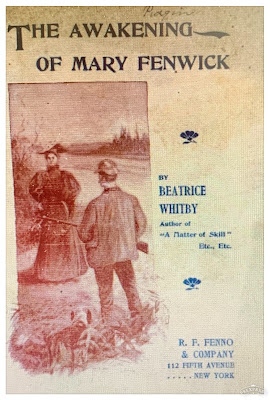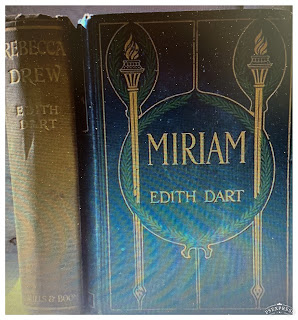Recently, whilst working on various documents and research leads sparked off by looking at catalogues of A2A and Devon Heritage Centre for as yet unnoticed unpublished writings by women, I've stumbled upon a group of authors at one time or other were closely associated with Devon, who wrote and published novels and fiction that previously I'd not known of. I'm rather excited about this discovery and have decided to take a bit of a break from searching into the archives and am instead currently doing the rounds of various search resources to find out more about each of the 'new' 'lost' authors for a future, probably next post on this blog. The original source was The Oxford Guide to Edwardian Fiction, a recently published compendium, and wonderful source book.
Although at this stage it is only a summary, I thought I'd make a preliminary start and share some of what I've found so far about the writers with a few links to such of the books that in my preliminary search are available, as and where I can locate them. The women were all more or less contemporaries and in several cases friends of Mary Patricia Willcocks, who is named in The Edwardian Guide and has already featured in this or my other blog several times. Until these latest discoveries I'd assumed MPW to have been the stand out Devon female writer from her time - and indeed in the sense of literary quality it may be that the quality of her writings will stand the literary test of time. But as yet I'm not had a chance to read any of the other's novels to compare their work with hers. Their combined oeuvre is quite extensive and will provide lots of extra reading material to keep me busy for the rest of this year. That's if I can locate the books in the first place.
I'll begin with Edith Dart, from Crediton (1871 - 1924), said to be a great friend of M P Willcocks, who published 5 novels between 1908 and 1920, including Miriam (1908); Rebecca Drew; Likeness (1911); Sareel (1922 - perhaps her last?), which according to one source was made into a film, although as yet I've not been able to verify this.
'It was a hot summer on the moor that year, hotter than even the oldest moor dweller could remember. Sun blazed down fiercely so that the short grass was shrivelled brown early in July, and the gorse blooms burnt and withered as soon as their yellow flowers appeared.' (From Edith Dart, Sareel)
****
Next in this list there's Zack (pseudonym of Gwendoline Keats 1865-1919), who, like Edith Dart, was author of at least 5 novels, the first published in 1898. Titles included On Trial (1899); The Roman Road (1903); Tales of Dunstable Weir (1901); and The White Cottage (1901). Zack/Keats also apparently wrote plays. She was born at Porthill near Northam in north Devon. I'm not sure yet if, like Edith Dart, Zack was a friend of Mary Patricia Willcocks, but I'd not be surprised if so as from the very preliminary moments of browsing through one or two of her novels her style seems similar in approach, especially in the way they introduce Devon places, (with the real name disguised using another fabricated name which is obviously derived from another Devon place) in the midst of a vivid atmospheric landscape setting often symbolic of the tempo and mood of the related narrative. I am wondering if perhaps if a few of these women formed some kind of writing group or circle.
Zack also features in a biography/literary appraisal by Carl Well, By Noble Things She Stands, available to read at Google Play Books.
'Halfway between two headlands lay the fishing village of Bere-Upton, a handful of cottages, some crushed in between the cliffs, others struggling upwards, following the hill's incline. Far out on the horizon's edge the November sun glowed dully across the water and then sank out of sight as if overwhelmed by the rising sea'. (Beginning of The White Cottage, By Zack).
****
Another writer who is named in The Edwardian Guide is Beatrice Whitby (d.1931) who was born and brought up in Ottery St Mary and between 1899 and 1911 (by which time I understand she'd married and moved away from Devon with her husband Philip Hicks), wrote at least 15 'mildly feminist' (New Woman?) novels. Both Beatrice's husband and father were doctors and she was educated at home. Her first novel The Awakening of Mary Fenwick was apparently a success and other titles included The Result of an Accident (1908); Foggy Fancies and Other Stories (1903); Part of the Property and The Whirligig of Time (1906) |
'Each morning I have looked from my window over the thatched cottages in the valley across to the high-piled hills, until I know every field and hedgerow, every tree and turn of the familiar landscape. I know every flower and shrub in the garden; I know the me and women living in the neighbouring hamlet a stone's throw from our door; I know their bright-eyed children who roam the lanes and woods; I know our batchelor Vicar, who, old in fashion as in years, croaks through our single Sunday service in the damp barn which serves for a church; I know the samart mistress of the smart Board School, a lady who sets the mode in Fairmile ...' (from Part of the Property).
'The curate preached on Wednesday evenings in the parish church and on Sunday afternoons in the little mission-church at Rose-Ash, unimportant services as far as numbers went. The week-day services were usually very thinly attended but when Pilkington preached the church could hardly hold the congregation. The record thought this sudden popularity would soon wear itself out; but it didn't. a deputation reached him one day after Pilkington had been in the parish about two months, from the Working Men's Club, asking him to allow his curate to preach to them more frequently, to take the Sunday sermon in fact...' (From The Quiver 1895, Alan St Aubyn)
****
'Very little has been heard lately about Mrs Templeton's difficulties, for it is well known that the Bishop has taken his wife's liabilities on himself and has proclaimed a system of retrenchment whereby he intends to free himself from them ...' (Opening of Allerton Towers, Annie Hall Thomas).
Then, and for now lastly, there's Frances Bancroft - pseudonym of Frances Charlotte Slater, born 1870), who was a farmer's daughter from South Africa and moved to England at some point. Bancroft published 18 novels between 1806 and 1958 some of which were successful, especially Of Like Passions, her third novel. I don't know when she moved to Devon but according to a letter written to the Literary Fund by MP Willcocks (who was presumably a friend) Bancroft's last years were spent in Paignton, where she was reduced to living on bread and rice, so her writing career can't have provided her with substantial income. I'm not sure if any of her novels were set in Devon, possibly now, but will hope to find out more anon.
'Steeped in the white light of a tropical sunshine and facing the re-bricked front of the Outspan - part farmhouse, part hostel, part country-store - with its single row of outhouses thrust like giant arms to right and left of the main building, ran the broad trail of the high-road - the sign and seal of an invisible civilisation, the link that bound the back-veldt dorps and farms of the Northern Transvaal to the life an stir of the great mining centres of the south ...' (from The Veldt Dwellers, Francis Bancroft, 1912)








No comments:
Post a Comment
Comments welcome!